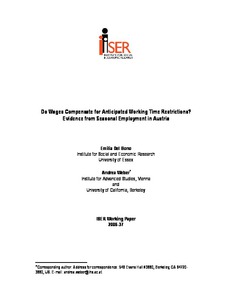Do wages compensate for anticipated working time restrictions? Evidence from seasonal employment in Austria
"This paper investigates the existence of compensating wage differentials across seasonal and non seasonal jobs which arise due to anticipated working time restrictions. We build on a theoretical model by Abowd and Ashenfelter (1981), which links the compensating wage differential to variation...
| Main Authors: | , |
|---|---|
| Institution: | ETUI-European Trade Union Institute |
| Format: | TEXT |
| Language: | English |
| Published: |
Colchester
2006
ISER |
| Subjects: | |
| Online Access: | https://www.labourline.org/KENTIKA-19125705124919439879-Do-wages-compensate-for-antici.htm |
| Summary: | "This paper investigates the existence of compensating wage differentials across seasonal and non seasonal jobs which arise due to anticipated working time restrictions. We build on a theoretical model by Abowd and Ashenfelter (1981), which links the compensating wage differential to variation in individual unemployment through the effect of the unemployment insurance and the compensated labor supply elasticity. We use longitudinal information from the Austrian administrative records to derive a definition of seasonality based on observed regularities in employment patterns. As wages change across seasonal and long term jobs for the same individual over time, we relate those changes to variations in unemployment and control for individual specific effects. In order to resolve the potential endogeneity of unemployment with respect to wages we use variation in the starting month of the job as an exogenous predictor of anticipated working time restrictions. We find that employers pay on average a positive wage differential of about 11% for seasonal jobs and that the unemployment insurance system contributes a similar amount." |
|---|---|
| Physical Description: | 52 p. Digital |

